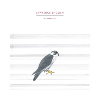 Lawrence English's latest release arrived at the perfect time for me, as I am in the throes of both a lengthy fascination with drone and a budding obsession with the New York Review of Book's masterfully curated publishing imprint.  The Peregrine is based on an "elegantly misanthropic" 1967 non-fiction work of the same title in which enigmatic writer/bird-watcher J.A. Baker becomes obsessed by a pair of falcons and stops identifying with humanity.  Befitting an album inspired by birds of prey, Lawrence's aesthetic here is considerably heavier and grittier than his characteristic pastoral ambiance.  In fact, this may be the first "difficult" Lawrence English album, but it is also a pretty stunning one.
Lawrence English's latest release arrived at the perfect time for me, as I am in the throes of both a lengthy fascination with drone and a budding obsession with the New York Review of Book's masterfully curated publishing imprint.  The Peregrine is based on an "elegantly misanthropic" 1967 non-fiction work of the same title in which enigmatic writer/bird-watcher J.A. Baker becomes obsessed by a pair of falcons and stops identifying with humanity.  Befitting an album inspired by birds of prey, Lawrence's aesthetic here is considerably heavier and grittier than his characteristic pastoral ambiance.  In fact, this may be the first "difficult" Lawrence English album, but it is also a pretty stunning one.
I have always been a fan of English's work, but his consistency is something of a mixed blessing.  He is reliably excellent and is undeniably one of the best choices for warm and immersive ambient drone, but that particular aesthetic has become pretty damn over-saturated in recent years.  Consequently, I am most interested in his departures from that comfort zone these days.  As far as such departures go, The Peregrine is an even more radical statement 2009's rather dark It's Up To Us To Live, as it is incredibly harsh and under-processed by Lawrence English standards.
Curiously, the base components of English's pleasantly shimmering sound beds remain mostly intact, but the atmosphere has been warped into something atypically stark, wintry, and forlorn (most conspicuously on the opening "The Hunting Life").Like a film director changing the whole complexion of a scene with a color filter, English has turned "pleasant" into "unsettling" with subtle dissonances, murkier fidelity, increased high-end sizzle, and unpolished edges (all enhanced, no doubt, by the vinyl medium). The effect is surprisingly dramatic and weirdly "punk"–I imagine this is how Lawrence would sound if he showed up at a basement party with only a synth and a mixer and blasted out a set through a couple of Marshall stacks.
My favorite two pieces are probably "The Roar Ceasing" and "Heavy Breath of Silence," but they only stand out from the rest of album because they both feature extremely low bass note progressions beneath their cold and bleak synth washes, making them feel a bit more melodic and kinetic than the surrounding material.  My ears might just be happy to have a very minor respite from the unforgiving small-scale existential horror of the rest of the album though.  Also, focusing on specific songs here is a fool's game: The Peregrine feels very much like an epic suite rather than a collection of individual pieces, so the arc and cumulative power is far more significant than the individual sections.
This is a very daring, minimal, and striking effort and I find myself increasingly marveling at its very existence.  I did not think English was capable of something so arctic, naked, and unrepentantly prickly.  He blindsided me here.  As a pre-existing fan, I love this album precisely because of that–English jettisoned almost everything that I enjoy and associate with him (tranquil beauty, crystalline production, amniotic warmth, etc.) and still managed to turn out something deeper, more successful, and more visceral that I ever would have expected.  Anyone new to Lawrence should probably dip their toes into something like Kiri No Oto or A Colour For Autumn before taking a chance on this more dark and primal side of his art, but this is definitely a significant peak in his oeuvre and a resounding artistic success.
Samples:
 
 
Read More

